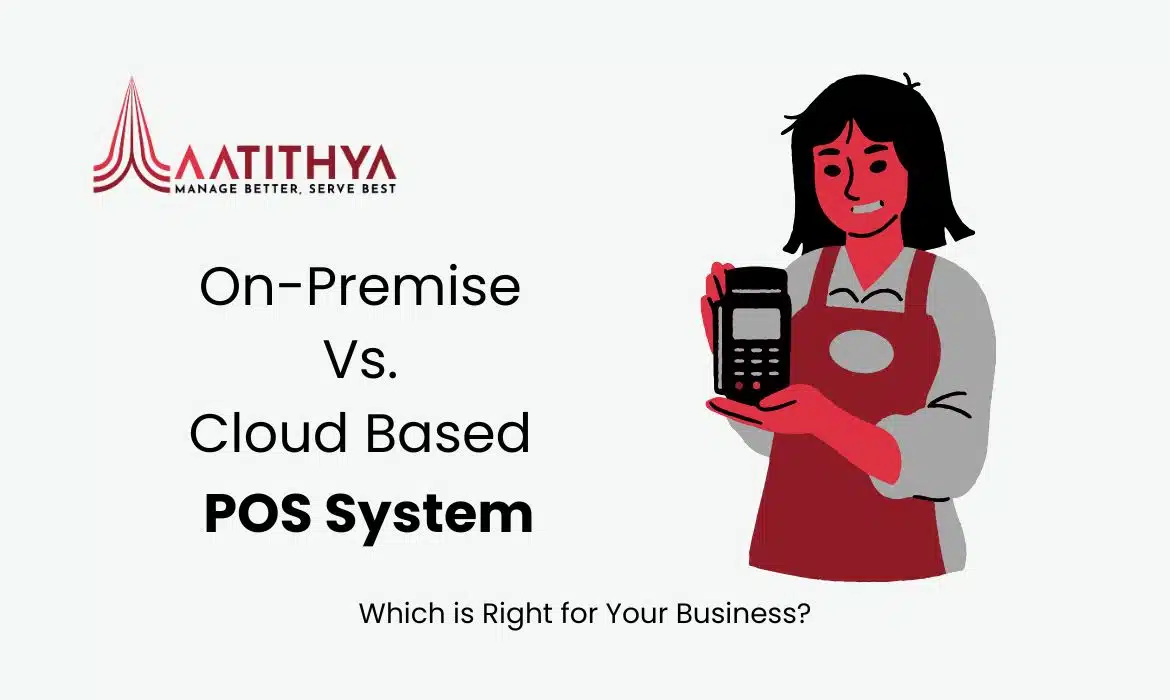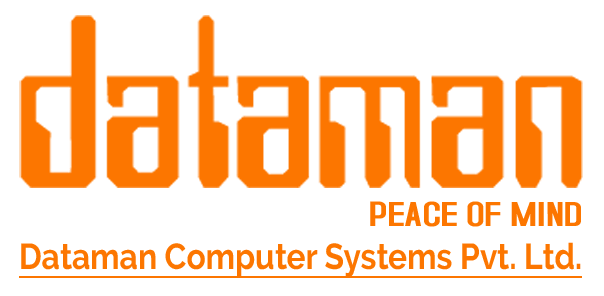- +91 9511117684
- shweta@dataman.in

Table of Contents
Post Views: 8,687
Point-of-sale (POS) systems have become indispensable tools for businesses of all sizes, streamlining operations and providing valuable insights into customer behavior. These systems, which are typically comprised of hardware and software components, enable businesses to process transactions, manage inventory, and track sales data.
When considering a POS system, businesses are often faced with a crucial decision that is whether to opt for an on-premise or cloud-based POS system solution. While both options have their advantages, cloud-based POS systems have emerged as a compelling choice for many businesses due to their inherent flexibility, scalability, and cost-effectiveness.
Read More: What is POS Software and How Does It Work
On-Premise POS Systems
On-premise POS systems are software solutions that are installed and operated on a local server. These servers are the business’s own hardware. This typically involves purchasing servers, workstations, and other necessary equipment to run the POS application on the business’s premises.
Key characteristics of on-premise POS systems include:
- Physical hardware: Requires on-site equipment for installation and operation.
- Local control: Businesses have complete control over the system’s hardware and software.
- Internal IT management: Requires in-house IT resources for maintenance and updates.
Advantages of On-Premise POS Systems
- Control: Businesses have full control over their POS system, including data storage, customization, and security.
- Customization: On-premise systems can be tailored to specific business needs and workflows.
- Security: Businesses may feel more secure knowing their data is stored on their own premises.
Potential Drawbacks of On-Premise POS Systems
- Upfront costs: On-premise systems often require a significant upfront investment in hardware and software.
- Maintenance: Businesses need to allocate resources for ongoing maintenance, updates, and troubleshooting.
Scalability: Scaling an on-premise system can be challenging and expensive, especially as a business grows.
Cloud-Based POS Systems
Cloud-based POS systems, also known as cloud POS or Software-as-a-Service (SaaS) POS, are hosted on remote servers accessible via the internet. Unlike on-premise systems, which require physical hardware and software installation, cloud POS solutions are delivered as a service, eliminating the need for significant upfront investments.
As per a report, Cloud-based HMS is gaining popularity due to its scalability, cost-effectiveness, and ease of access.
Advantages of Cloud-Based POS Systems
- Accessibility: Cloud-based POS systems can be accessed from anywhere with an internet connection, providing flexibility and convenience for businesses with multiple locations or remote employees.
- Scalability: Cloud POS solutions can easily adapt to changing business needs. As your business grows or shrinks, you can adjust your subscription plan accordingly, ensuring optimal resource allocation.
- Cost-Effectiveness: Cloud-based POS systems often have lower upfront costs compared to on-premise systems. Additionally, subscription-based pricing models eliminate the need for ongoing maintenance expenses.
- Regular Updates: Cloud providers automatically update the software, ensuring that businesses always have access to the latest features and security patches.
- Disaster Recovery: Cloud-based systems typically include built-in disaster recovery features, safeguarding your data in case of hardware failures or natural disasters.
Addressing Common Concerns
- Data Security: While data security is a valid concern, reputable cloud providers implement robust measures to protect sensitive information. These measures often include encryption, access controls, and regular audits.
- Internet Connectivity: Reliance on a stable internet connection is a potential drawback. However, with the increasing availability and reliability of broadband internet, this concern is becoming less significant for many businesses.
- Vendor Lock-in: Some businesses may worry about becoming dependent on a specific cloud provider. It’s essential to choose a provider with a flexible contract and a reputation for customer satisfaction.
Read More: What is Cloud Kitchen? A Guide for Restaurant Owners
On-Premise Vs. Cloud Based POS System
| Feature | On-Premise POS System | Cloud Based POS System |
|---|---|---|
| Initial Investment | Higher | Lower |
| Ongoing Costs | Maintenance, upgrades, IT support | Subscription fees |
| Scalability | May require hardware upgrades | Easily scalable |
| Control | More control over hardware and software | Less control, but often managed services |
| Accessibility | Limited to on-site access | Accessible from anywhere with an internet connection |
Data Security | Depends on in-house security measures | Relies on vendor’s security measures |
Key Factors to Consider When Choosing
When deciding between an on-premise or cloud-based POS system, several key factors should be carefully evaluated to ensure the best fit for your business.
Business Size and Needs: The scale of your operations and specific requirements will significantly influence your choice. Small businesses may find a cloud-based POS system more suitable due to its lower upfront costs and scalability. Larger enterprises with complex needs might benefit from an on-premise solution for greater control and customization.
Budget: Consider the initial investment and ongoing costs associated with each option. On-premise systems often require a substantial upfront expenditure for hardware, software, and installation. Cloud-based systems, on the other hand, typically have lower upfront costs but may incur recurring subscription fees. Evaluate your budget constraints and long-term financial goals to determine the most cost-effective choice.
Technical Expertise: Assess your team’s capabilities for managing IT infrastructure. On-premise systems require in-house technical expertise for installation, maintenance, and troubleshooting. Cloud-based systems, however, are generally easier to manage as the provider handles most technical aspects. Consider the availability of internal resources or the need for external IT support to determine the most suitable option.
Data Security: Data security is a critical concern for businesses of all sizes. Both on-premise and cloud-based systems can be secure when implemented correctly. However, cloud-based providers often have dedicated security teams and advanced infrastructure to protect sensitive data. Research the security measures in place for your chosen provider to ensure your data is adequately protected.
Scalability: Consider your business’s growth potential and the ability of the system to adapt. Cloud-based POS systems are highly scalable, allowing you to easily add or remove features and users as your business expands. On-premise systems may require more significant hardware and software upgrades to accommodate growth. Evaluate your future plans and choose a system that can support your business’s evolving needs.
Read More: Impact of GST on Hotel Industry
Aatithya POS Software
Aatithya offers a state-of-the-art Point of Sale (POS) software designed to streamline operations and enhance customer experiences. Our solution is tailored to meet the diverse needs of businesses, from small retail stores to large-scale enterprises.
Key Features and Benefits:
- Intuitive Interface: Our user-friendly interface ensures easy navigation and efficient workflow.
- Robust Inventory Management: Track stock levels, manage purchase orders, and prevent stockouts.
- Customer Relationship Management (CRM): Build strong relationships with customers and personalize their shopping experience.
- Payment Processing: Accept various payment methods, including credit cards, cash, and digital wallets.
- Reporting and Analytics: Gain valuable insights into your business performance with detailed reports.
Read More: Night Audit: Steps in Night Audit process in Front Office
Conclusion
In conclusion, the choice between an on-premise and cloud-based POS system ultimately depends on the specific needs and circumstances of your business. While on-premise systems offer greater control and customization, cloud-based POS systems often provide more flexibility, scalability, and cost-effectiveness.
If you’re considering a POS system for your business, we encourage you to contact our team of experts to discuss your specific requirements. We can help you evaluate your options and determine which solution is the best fit for your organization.
0

